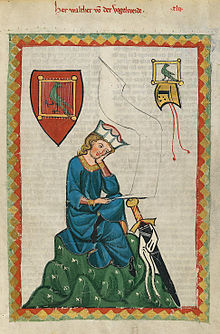This article includes a list of references, related reading, or external links, but its sources remain unclear because it lacks inline citations. (February 2020) |

| Part of a series on |
| Medieval music |
|---|
| Overview |
|
|
Minnesang (German: [ˈmɪnəzaŋ] ; "love song") was a tradition of German lyric- and song-writing that flourished in the Middle High German period (12th to 14th centuries). The name derives from minne, the Middle High German word for love, as that was Minnesang's main subject. People who wrote and performed Minnesang were known as Minnesänger (German: [ˈmɪnəˌzɛŋɐ] ), and a single song was called a Minnelied (German: [ˈmɪnəˌliːt] ). The Minnesänger are comparable to the Occitan troubadours and northern French trouvères, but they are "an original German contribution to courtly lyric."[1]
- ^ Pelnar-Zaiko, Ivana (1982). "Minnesingers". In Strayer, Joseph Reese (ed.). Dictionary of the Middle Ages. New York: C. Scribner's Sons. p. 414. ISBN 978-0-684-19073-0.